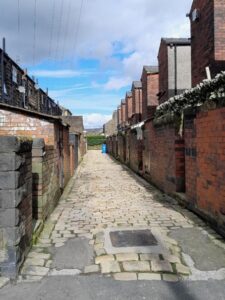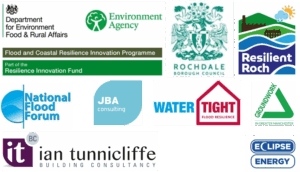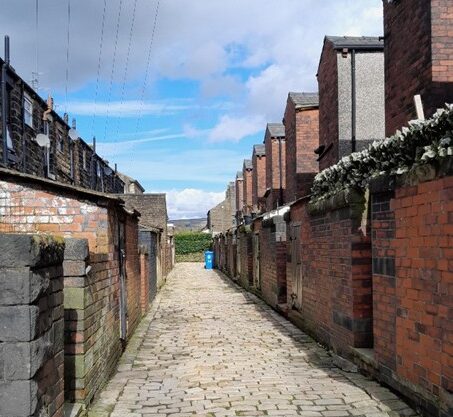Paul O’Hare, Manchester Metropolitan University
Resilient Roch
Rochdale Borough Council is pioneering a proactive approach to climate resilience through its Resilient Roch project. Funded by the Flood and Coastal Resilience Innovation Programme (FCRIP), this initiative targets flood-prone communities with an innovative strategy: conducting coordinated property-level surveys that assess flood risk, energy efficiency, and housing condition simultaneously.
The flooding challenge
Rochdale’s inner-urban areas, dominated by Victorian and Edwardian terraced housing, face increasing flood risks from river, surface water, and drainage sources. Some suffer from poor maintenance, damp cellars, and low energy efficiency – issues that compound residents’ vulnerability to flooding and fuel poverty. Many households also experience socio-economic disadvantages, making resilience-building efforts even more critical – and all the more challenging.

The three surveys
The team initially coordinated and streamlined three types of surveys – Property Flood Resilience (PFR), energy performance, and structural condition (see the case study). This innovative approach not only reduced disruption for residents but also enabled surveyors to align interventions more effectively. For example, identifying structural issues early ensured that flood resilience measures wouldn’t be compromised by poor building conditions.
Initially, three separate surveys were conducted for each property. These were later consolidated into two surveys after overlapping elements and redundancies were streamlined.
The benefits
Coordinating multiple surveys improved efficiency for residents, enabled better alignment of interventions, and uncovered serious safety issues. It also fostered cross-team collaboration and innovation within the council and delivery partners.
The surveys uncovered serious safety concerns, including structural defects and a carbon monoxide leak, prompting swift action from the council. They also facilitated access to additional support services, such as mobility grants and roof replacement funding. Importantly, the project created a safe pathway for tenants to report housing issues without fear of eviction, thanks to council-led surveys which considered building condition.
Challenges
The programme faced challenges. Coordinating multiple survey types required careful planning. There was some initial confusion among residents about the process which increased administrative workload. Improved communication and consistent branding helped overcome these hurdles, reassuring residents that the initiative was legitimate and council-backed.
Engaging landlords, especially absentee or reluctant ones, proved difficult. Language and cultural barriers also slowed communication in diverse communities. Yet, trusted local groups and flood action teams played a vital role in building trust and encouraging participation.
Current grant funding criteria limit the opportunity for the integration of flood resilience, energy efficiency, and housing condition improvements. Future grant schemes must accommodate integrated ‘whole of society’ and ‘whole of property’ approaches if we are to achieve dual policy objectives of climate resilience and decent homes standards. This demands cross departmental policy initiatives.
Next steps
The project’s integrated approach has laid the groundwork for future innovations. Data collected during surveys is now informing research into Flood Performance Certificates. It is also highlighting the need for more inclusive funding schemes that support holistic property improvements.
A final thought…
By addressing flood risk, energy efficiency, and housing quality together, Rochdale is setting a precedent for climate resilience that benefits both people and place.
The Resilient Roch project demonstrates how thoughtful coordination, community engagement, and cross-sector collaboration can transform flood resilience efforts. It’s a model that other councils and communities can learn from as they prepare for the growing impacts of climate change.
To speak to us about the work, contact the Resilient Roch team at [email protected]
The work was funded by the Flood and Coastal Resilience and Innovation Programme.
—
Further information:
Local Government Association case study
Environment Agency FCRIP project overview
BeFloodReady case study – coordinating property level surveys for climate resilience in Rochdale


